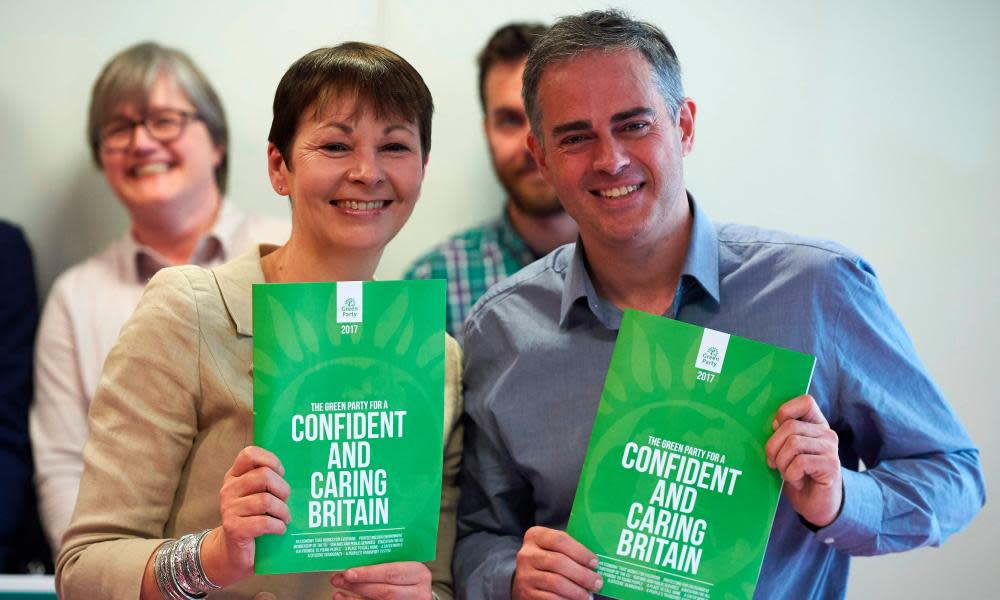A progressive alliance is an idea whose time has come | Neal Lawson

As the polls narrow, the Tories attack the idea of a progressive alliance and the possibility of coalition government because they know these could deny them their landslide. In the long term they fear a progressive realignment breaking their stranglehold on office and power. They are right to be scared because while on the surface all for them seems strong and stable, just below a new politics is bubbling up.
If Antonio Gramsci’s haunting phrase “the old is dying and the new cannot be born” was ever applicable to a UK general election, then it is this one. The old election is taking place in party headquarters, at the daily press briefings and meet-the-people events with no real people. But what is most old-school about this election is the main parties’ tribalism: “Only Labour can defend the NHS”; “Only the Tories can provide strong and stable blah”. It’s all about them: they believe they have a monopoly on the wisdom, superiority and singular ability to manage a world that is becoming more complex by the day. They are out of their depth. We know it and inwardly they do too.
Labour activists and MPs who wanted to work with other parties were blocked from above
The new election campaign is happening from the bottom up in local parties and communities. When Labour insisted on standing a candidate in the Richmond Park byelection last November, after the Greens stood aside to give the Liberal Democrats a freer run at Zac Goldsmith, thus establishing the working principle of the Progressive Alliance, Labour polled fewer votes than they had members. It is always the people who get it first.
Because what is being exposed during this campaign are the limits of deeply tribal parties in an increasingly non-tribal society. Our democracy is a tired adversarial system designed for two parties when we live in a multi-party moment. Young people simply don’t understand why you can’t join more than one party – and often do. The Women’s Equality Party has shown a different way of doing things is possible by saying this is fine.
Critics complain that “progressive” is a woolly term, so let me define it: being a progressive means believing the best in people, not the worst; that a good society is one that knows it is not yet good enough. It means being impatient for greater equality, democracy and sustainability.
When a progressive alliance government is formed it will introduce proportional voting so we never have to fight against the electoral system again. So this is more than just a deal to defeat the Tories in June. The progressive alliance is based on the principle that we make better decisions by working together. Unlike the arrogant view that any one party knows it all and can do it all, we believe there is wisdom to be found in the crowd. The Greens think most about the environment, Labour about work and the Liberals about liberty. This can be a winning political hand. Not least because it starts to help us deal with the complexity of the world we face.
The Greens have been generous and principled by standing down in many seats. The Lib Dems have made a gesture in Brighton Pavilion for Caroline Lucas, the Green co-leader. But Labour activists and MPs who wanted to work with other parties were blocked from above. It is Labour’s leaders, the biggest beneficiaries of the progressive alliance, who have turned their backs on cooperation to defeat the Tories. They claim the mantle of fairness and solidarity, but show little of it.
So where does this leave us? In more than 40 seats, progressive alliances have been formed. This alone is a seismic step in UK politics. Next month we will witness the biggest tactical vote movement this country has ever seen, made possible by new technology. But there is much more. First, being “progressive” has now replaced the idea of being liberal. “Progressive” will be the lexicon of the left and centre-left for decades to come. Second, the art of collaboration and not competition is being established as the baseline of political thought and action in the 21st century. It is being established in 2017 so it can win in 2022.
Meanwhile, the bureaucrats hang on as fast as they can. Gramsci warned that “morbid symptoms” characterise the interregnum between the old and new. The party hacks are the morbid symptoms, expelling people from Labour for standing up for the NHS. Their power is the status quo. They fear losing control and look like East German Stasi guards trying to stop the people knocking down the Berlin Wall. They can catch the first few, but not the millions who follow. If the old parties don’t change, they will die. Whatever happens on 8 June, it’s clear it falls to us, the people, to create a progressive future that is as desirable as it is feasible.

 Yahoo News
Yahoo News 
